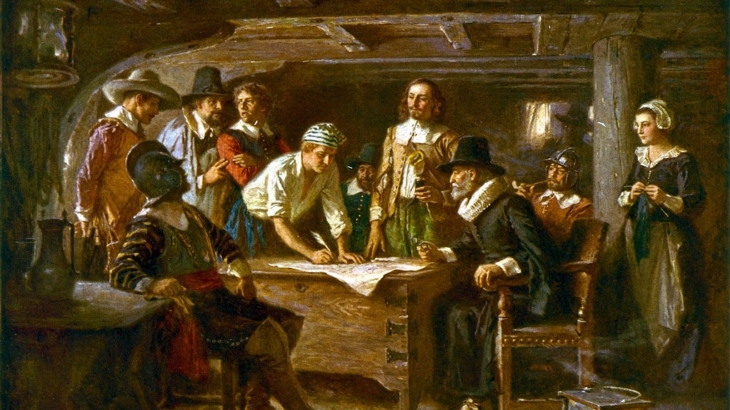Classical History and Governing Devoted to Freedom and Independence Through Restraining Power of Elected Representatives
 Essay Read By Constituting America Founder, Actress Janine Turner
Essay Read By Constituting America Founder, Actress Janine Turner
Other impacts of the Protestant Reformation derive directly from the teachings of John Calvin (1509-1564), a Frenchman by birth who spent most of his life in Geneva, Switzerland. The distinguishing characteristic of Calvinist Protestantism, as presented in his Institutes of the Christian Religion (1535), is the doctrine of predestination, meaning that God has predestined or foreordained some people (called the “elect”) for salvation and others for damnation. This is part of eternal law and, as such, there is nothing anyone can do about it. It is an unchangeable decision made by God, not a matter of the potential believer’s free will. Knowing if one is among the elect is a problem, however. The psychological insecurity this caused was severe.
The German sociologist Max Weber (1864-1920) published The Protestant Ethic and the Spirit of Capitalism in 1905. Written as a response to Karl Marx’s theory of economic determinism, Weber wanted to show that history could have a prime mover other than economics, namely religion, and argued that Calvinists searched for certainty of salvation in a God-given calling (a job or career), unceasing hard work, and the suppression of physical pleasure. In other words, one could know one was among the elect by working hard and saving and investing rather than spending one’s money and enjoying one’s self. This has come to be known as the Protestant or Puritan work ethic.
The argument continues that the Puritans brought this work ethic with them to North America and that it permeated the entire culture.[i]
Prof. Davis calls the Protestant or Puritan ethic “the beginning of the American dream,” saying
“Political, social, and economic life in the late twentieth century bears scant resemblance to the Puritan way. Yet the religious doctrine of the Puritans had a profound influence on a central characteristic of our tradition – the American dream. For modern Americans, that dream is typically one that involves success measured in terms of material wealth. . . . To all appearances that dream of success has no connection with the religious views, values, and aspirations of the Puritans. It is possible, nevertheless, to uncover the seeds of the modern individual’s pursuit of private wealth in the seventeenth-century Puritan’s quest for salvation.”[ii]
Puritans on both sides of the Atlantic embraced the ideas of the covenant or social contract (government based on consent of the governed), natural rights, and resistance to unjust authority (which itself was a natural right). Before they disembarked from the Mayflower in 1620 the Pilgrims wrote and signed the Mayflower Compact, thereby creating the first written social contract in history. It was first published in London in 1622 and reads as follows in modern English:
“In the name of God, Amen. We, whose names are underwritten, the Loyal Subjects of our dread Sovereign Lord, King James, by the Grace of God, of England, France and Ireland, King, Defender of the Faith, e&.
Having undertaken for the Glory of God, and Advancement of the Christian Faith, and the Honour of our King and Country, a voyage to plant the first colony in the northern parts of Virginia; do by these presents, solemnly and mutually in the Presence of God and one of another, covenant and combine ourselves together into a civil Body Politick, for our better Ordering and Preservation, and Furtherance of the Ends aforesaid; And by Virtue hereof to enact, constitute, and frame, such just and equal Laws, Ordinances, Acts, Constitutions and Offices, from time to time, as shall be thought most meet and convenient for the General good of the Colony; unto which we promise all due submission and obedience.
In Witness whereof we have hereunto subscribed our names at Cape Cod the eleventh of November, in the Reign of our Sovereign Lord, King James of England, France and Ireland, the eighteenth, and of Scotland the fifty-fourth. Anno Domini, 1620.”
Twenty-one years later our Puritan forefathers saw the need for a delineation of rights and adopted the Massachusetts Body of Liberties in 1641. This “was the first attempt in the colonies to restrain the power of the elected representatives by appealing to a fundamental document that lists the rights and duties of the people. The document . . . combined the early American covenanting tradition of the Mayflower Compact with an appeal to the common law tradition that crossed the Atlantic from Britain. The Massachusetts Body of Liberties contains ninety-eight sections. . . The most enduring part . . . is the preamble and the first seventeen sections . . .” The preamble reads as follows:
The free fruition of such liberties, immunities and privileges as humanity, civility, and Christianity call for as due to every man in his place and proportion without impeachment and infringement hath ever been and ever will be the tranquility and stability of churches and commonwealths. And the denial or deprival thereof, the disturbance if not the ruin of both.
We hold it therefore our duty and safety whilst we are about the further establishing of this government to collect and express all such freedoms as for present we foresee may concern us, and our posterity after us, and to ratify them with our solemn consent.
We do therefore this day religiously and unanimously decree and confirm these following rights, liberties and privileges concerning our churches, and civil state to be respectively impartially and inviolably enjoyed and observed throughout our jurisdiction forever.
Space limitations preclude including the 17 sections here but they can be accessed at https://teachingamericanhistory.org/document/the-massachusetts-body-of-liberties/.
It is interesting to see how these ideas made their way back across the Atlantic to England. In 1644 a Scottish Presbyterian by the name of Samuel Rutherford published a book in London titled Lex Rex which contained all these ideas. The Puritan Revolution or English Civil War led by Cromwell lasted from 1640 to 1649 and gave birth to Thomas Hobbes’ Leviathan, first published in 1651, which was based on the natural right to life and created a powerful state whose legitimacy derived from the consent of the governed to protect it.
This was followed by John Locke’s Two Treatises of Government which were published in 1689 at the time of the Glorious Revolution and the English Bill of Rights. Locke proposed that government emerges from the consent of the governed to protect the natural rights of life, liberty and property.
These ideas were picked up by the authors and signers of the Declaration of Independence in 1776.
“The American Revolution might thus be said to have started, in a sense, when Martin Luther nailed his 95 theses to the church door in Wittenberg. It received a substantial part of its theological and philosophical underpinnings from John Calvin’s Institutes of the Christian Religion and much of its social theory from the Puritan Revolution of 1640-1660, and, perhaps less obviously, from the Glorious Revolution of 1689. Put another way, the American Revolution is inconceivable in the absence of the context of ideas which have constituted Christianity. The leaders of the Revolution in every colony were imbued with the precepts of the Reformed faith.[iii]
 Winfield H. Rose, Ph.D., is Distinguished Professor of Political Science Emeritus at Murray State University.
Winfield H. Rose, Ph.D., is Distinguished Professor of Political Science Emeritus at Murray State University.
[i] Sanford Kessler, “Tocqueville’s: Christianity and the American Founding.” The Journal of Politics, v. 54 #3, August 1992, pp. 776-792.
[ii] Sue Davis, American Political Thought: Four Hundred Years of Ideas and Ideologies. Prentice Hall, 1996, p. 22. Emphasis added.
[iii] Page Smith, quoted in Amos and Gardiner, p. 3. Emphasis added.
Click here for First Principles of the American Founding 90-Day Study Schedule.
Click here to receive our Daily 90-Day Study Essay emailed directly to your inbox.

 https://en.wikipedia.org/wiki/Mayflower_Compact
https://en.wikipedia.org/wiki/Mayflower_Compact https://en.wikipedia.org/wiki/Mayflower#/media/File:Embarkation_of_the_Pilgrims.jpg
https://en.wikipedia.org/wiki/Mayflower#/media/File:Embarkation_of_the_Pilgrims.jpg https://en.wikipedia.org/wiki/American_Revolutionary_War#/media/File:British_Army_in_Concord_Detail.jpg
https://en.wikipedia.org/wiki/American_Revolutionary_War#/media/File:British_Army_in_Concord_Detail.jpg
Join the discussion! Post your comments below.
Your feedback and insights are welcome.Feel free to contribute!